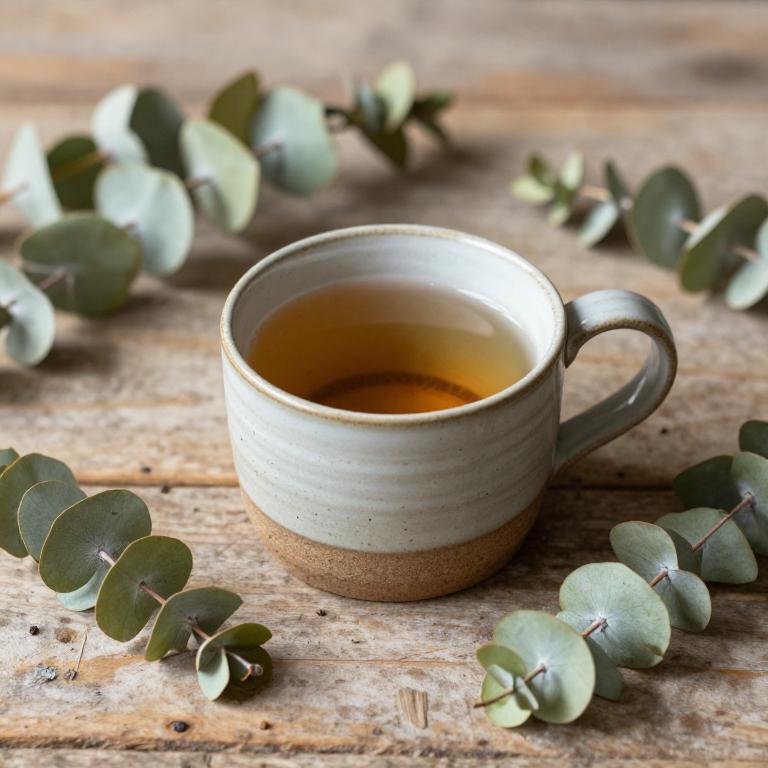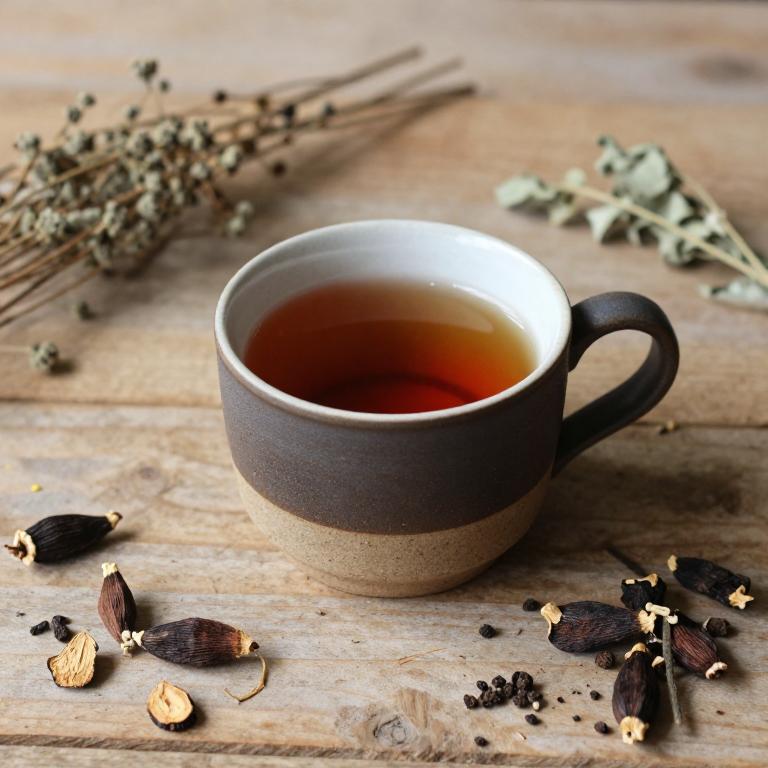10 Best Herbal Teas For Chest Congestion

Herbal teas can be a natural and effective remedy for relieving chest congestion by soothing the respiratory system and reducing inflammation.
Commonly used herbs such as eucalyptus, ginger, thyme, and licorice root are known for their decongestant and anti-inflammatory properties. These teas work by loosening mucus, improving airflow, and calming irritated airways, making them beneficial for individuals suffering from colds, bronchitis, or allergies. To prepare, simply steep the dried herbs in hot water for several minutes, and drink slowly to maximize their therapeutic effects.
While herbal teas are generally safe, it's advisable to consult a healthcare provider before use, especially for those with underlying health conditions or who are pregnant.
Table of Contents
- 1. Eucalyptus (Eucalyptus globulus)
- 2. Peppermint (Mentha piperita)
- 3. Thyme (Thymus vulgaris)
- 4. Ginger (Zingiber officinale)
- 5. Rosemary (Rosmarinus officinalis)
- 6. Black pepper (Piper nigrum)
- 7. Camellia (Camellia sinensis)
- 8. Licorice (Glycyrrhiza glabra)
- 9. Fennel (Foeniculum vulgare)
- 10. Turmeric (Curcuma longa)
1. Eucalyptus (Eucalyptus globulus)

Eucalyptus globulus, commonly known as eucalyptus or gum tree, is widely used in herbal teas to alleviate chest congestion due to its potent anti-inflammatory and decongestant properties.
The essential oils in eucalyptus globulus, particularly cineole, help to loosen mucus and reduce inflammation in the respiratory tract, making it easier to breathe. When brewed into a tea, eucalyptus globulus can soothe sore throats and ease the symptoms of bronchitis, colds, and other respiratory infections. It is often combined with other herbs like peppermint or ginger to enhance its effectiveness and provide a more balanced flavor.
However, it is important to consult a healthcare professional before using eucalyptus tea, especially for individuals with asthma or those taking certain medications.
2. Peppermint (Mentha piperita)

Mentha piperita, commonly known as peppermint, is often used in herbal teas to help alleviate chest congestion due to its soothing and decongestant properties.
The essential oils in peppermint, particularly menthol, can help relax the muscles in the airways and ease breathing, making it beneficial for those suffering from coughs or tightness in the chest. Peppermint tea can also help reduce inflammation in the respiratory tract, providing relief from symptoms associated with colds, bronchitis, or other respiratory conditions. It is typically prepared by steeping fresh or dried peppermint leaves in hot water, and it can be enjoyed either hot or cold, depending on personal preference.
While generally safe, individuals with certain health conditions or those taking medications should consult a healthcare provider before using peppermint tea as a remedy.
3. Thyme (Thymus vulgaris)

Thymus vulgaris, commonly known as thyme, is a popular herb used in herbal teas to help alleviate symptoms of chest congestion.
The essential oils in thyme, particularly thymol, possess strong antimicrobial and antispasmodic properties that can soothe irritated airways and reduce mucus buildup. When brewed into a warm tea, thyme can act as a natural expectorant, making it easier to expel phlegm and improve breathing. It is often combined with other herbs like eucalyptus or ginger to enhance its decongestant effects.
While generally safe, thyme tea should be used with caution by individuals with allergies or certain medical conditions, and it is advisable to consult a healthcare provider before regular use.
4. Ginger (Zingiber officinale)

Zingiber officinale, commonly known as ginger, is widely used in herbal teas to help alleviate symptoms of chest congestion.
The active compounds in ginger, such as gingerol and shogaol, possess anti-inflammatory and antispasmodic properties that can help reduce mucus production and ease breathing. When brewed into a warm tea, ginger can soothe the throat and provide a warming effect that promotes easier respiration. Many people find that drinking ginger tea helps relieve coughing and loosen chest congestion, making it a natural remedy for respiratory discomfort.
However, it is advisable to consult a healthcare professional before using ginger tea as a treatment, especially for severe or persistent chest congestion.
5. Rosemary (Rosmarinus officinalis)

Rosmarinus officinalis, commonly known as rosemary, is a fragrant herb often used in herbal teas to help alleviate symptoms of chest congestion.
The essential oils in rosemary, such as cineole and camphor, have expectorant properties that can help loosen mucus and ease breathing. When brewed into a tea, rosemary can soothe irritated airways and reduce inflammation in the respiratory tract. It is often combined with other herbs like thyme or eucalyptus to enhance its decongestant effects.
However, it is important to consult a healthcare provider before using rosemary tea, especially for those with chronic respiratory conditions or pregnant women.
6. Black pepper (Piper nigrum)

Piper nigrum, commonly known as black pepper, is often used in herbal teas to help alleviate chest congestion due to its warming properties and expectorant effects.
The active compound, piperine, may help loosen mucus and improve respiratory function by stimulating the production of mucilage in the respiratory tract. When brewed into a tea, black pepper can be combined with other herbs like ginger or turmeric to enhance its bronchodilating and anti-inflammatory benefits. This herbal tea is particularly beneficial for individuals experiencing dry or productive coughs associated with colds or bronchitis.
However, it is important to consult a healthcare provider before using black pepper tea, especially for those with existing health conditions or taking medications.
7. Camellia (Camellia sinensis)

Camellia sinensis, the plant from which green and black teas are derived, contains compounds that may help alleviate chest congestion due to its anti-inflammatory and bronchodilatory properties.
Herbal teas made from Camellia sinensis, such as green or white tea, can soothe the respiratory tract and reduce mucus production, making it easier to breathe. These teas also contain antioxidants like catechins, which support immune function and may reduce inflammation in the airways. Drinking Camellia sinensis-based herbal teas can be a natural remedy for mild chest congestion, though it should not replace medical treatment for severe respiratory issues.
For best results, it is often recommended to consume these teas warm and in moderation as part of a holistic approach to respiratory health.
8. Licorice (Glycyrrhiza glabra)

Glycyrrhiza glabra, commonly known as licorice root, has been traditionally used in herbal teas to alleviate chest congestion due to its expectorant and anti-inflammatory properties.
The active compounds in licorice, such as glycyrrhizin and flavonoids, help loosen mucus in the respiratory tract, making it easier to expel. It also soothes irritated mucous membranes, reducing coughing and discomfort associated with colds or bronchitis. However, prolonged use of licorice root tea should be avoided, as it may lead to side effects like hypertension or fluid retention.
When used in moderation, licorice root tea can be a natural and effective remedy for temporary relief of chest congestion.
9. Fennel (Foeniculum vulgare)

Foeniculum vulgare, commonly known as fennel, is a herbal remedy often used in teas to help alleviate symptoms of chest congestion.
The essential oils in fennel, particularly anethole, have expectorant properties that can help loosen mucus and ease breathing. Fennel tea is typically prepared by steeping the dried seeds in hot water, and it is often consumed warm to enhance its soothing effects. It is especially beneficial for individuals experiencing coughs or respiratory discomfort due to its mild anti-inflammatory and antimicrobial benefits.
However, it is advisable to consult a healthcare professional before using fennel tea, especially for those with existing health conditions or who are pregnant.
10. Turmeric (Curcuma longa)

Curcuma longa, commonly known as turmeric, is often used in herbal teas to help alleviate symptoms of chest congestion due to its anti-inflammatory and antioxidant properties.
The active compound in turmeric, curcumin, can help reduce inflammation in the respiratory tract and loosen mucus, making it easier to expel. When brewed into a tea, turmeric can be combined with other herbs like ginger or eucalyptus to enhance its decongestant effects. Regular consumption of turmeric tea may support respiratory health and provide relief from mild chest congestion.
However, it is advisable to consult a healthcare professional before using turmeric tea as a remedy, especially for persistent or severe respiratory conditions.